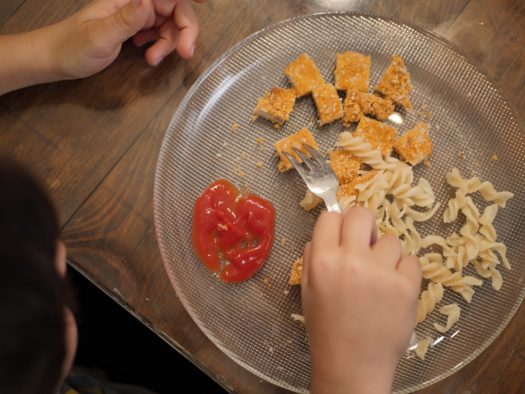by Deb Bruns, PhD
There are many articles written about young children attaining developmental milestones such as walking, producing multiple word phrases, and writing their name. There are also external influences on the development of these skills including prematurity and exposure to language models, that may result in milestones being achieved at differing times.
As discussed in the webinar, Yuck! I don’t eat that!, a range of factors impact the development of feeding skills including familial mealtime practices, cultural preferences and food choices. While the focus of the webinar was primarily on nutrition and selective eating in young children with autism, the strategies and resources shared can assist a range of young children and their families. In this blog, we share additional information related to food preparation and presentation, engaging with food, and several resources to help in extreme cases of feeding challenges.
Presentation matters!
Food presentation can encourage a selective eater to try a novel food. There is research that highlights differences in food presentation preferences between children and adults.
- The Food Network has several recipes and strategies for presenting food that will appeal to children.
- The Children’s Healthcare of Atlanta provides practical ideas for food presentation for young children in this article.
- The Academy of Nutrition and Dietetics provides guidance and tips for food presentation to entice picky eaters.
Shop and prepare meals together!
Including an older toddler or preschooler in purchasing and/or preparing a snack or meal, can facilitate fine motor, language and social-emotional skills and promote positive outcomes.
- The Good Food area of this BBC website highlights cooking skills by age.
- Check out these ideas for easy recipes with just a few ingredients from Taste of Home.
- Food preparation can encourage healthy eating habits in the short and long term.
DO play with your food!
A common concern is young children’s resistance to trying new foods. Developmentally, this is common in toddlers. Yet, continued reliance on a few food items is often associated with children diagnosed with an autism spectrum disorder for example. Supervised opportunities to “play” with food can encourage exploration and acceptance of food whether these are novel or familiar food items. It is important to consider cultural and familial views on this practice as food play may be frowned upon. It is recommended to honor an individual family’s preference.
- Researchers from De Montfort University in the United Kingdom focused on playing with food to encourage acceptance of fruits and vegetables
- Heidi Liefer Moreland, a speech and language pathologist, provides a step-by-step guide to teach finger feeding with a detailed list of foods and their preparation to encourage exploration.
Useful Books & Websites
There are also books that cover topics such as feeding development, diversity in feeding practices, assessment, and interventions for specific issues such as oral motor difficulties, and supporting young children with tube feedings.
Needs of Military Families
We need to consider that military families with young children with feeding challenges might face unique circumstances. For instance, the potential need for frequent moves due to relocation for a new assignment can cause disruption in services and supports. Feeding gains, as in other areas of development, can be variable with peaks and valleys even with consistent interventions and providers.
- Feeding clinics such as the one at the West Virginia University Center for Excellence in Disabilities can be helpful for families. Programs such as this can provide referral information and, potentially, services if a child meets the eligibility criteria.
- Additionally “parent-friendly” materials such as Practice and Patience: Strategies to Address Feeding Problems in Early Childhood contain general information about developmental milestones and interventions to address food selectivity and sensory issues. Specific sections of these resources can be shared with caregivers depending on their young child’s feeding strengths and needs.
- When a family with a child with feeding challenges moves to a new geographic area, it is also critical to connect with a local early intervention or early childhood special education agency for information about feeding programs and providers including speech pathologists with expertise in feeding and swallowing concerns.
Image from Pexels.com, CC0













